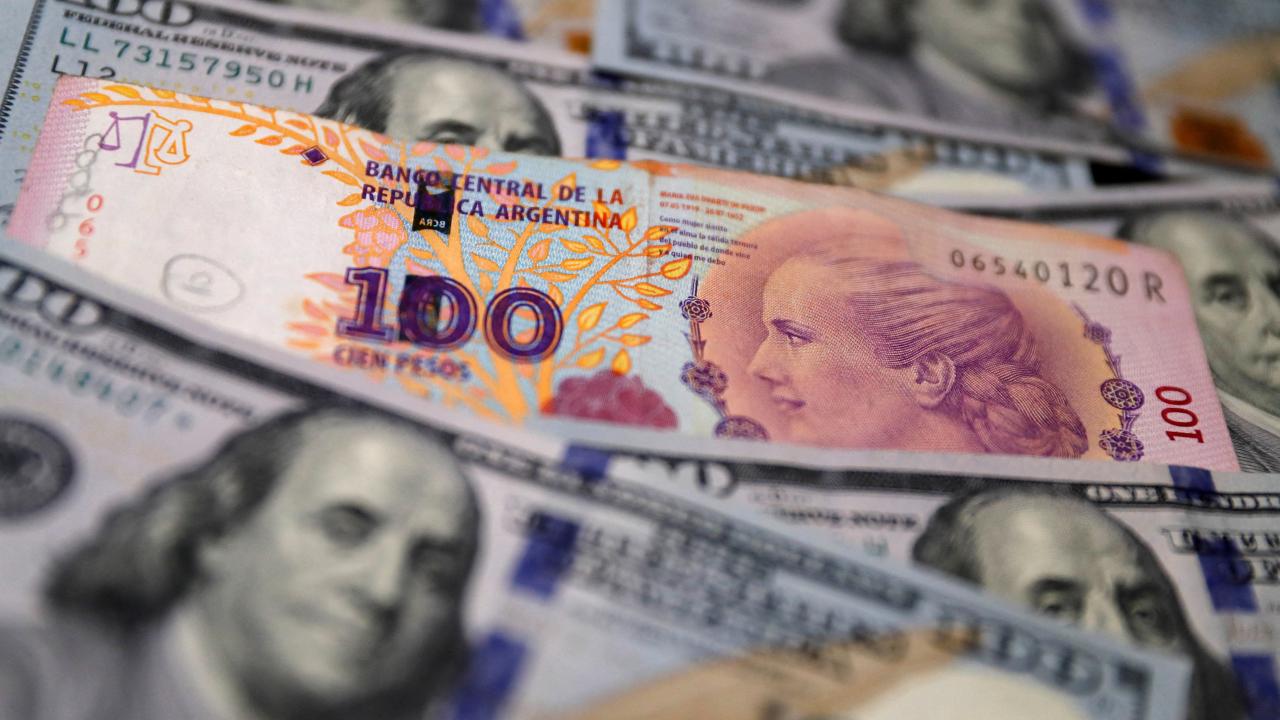
The South American nation, under the leadership of libertarian President Javier Milei, is trying to rebuild investor confidence.
Argentina and the International Monetary Fund (IMF) may be in the final stretch of a new $20 billion program, but so far the agreement has failed to allay traders' anxiety and a cloud of uncertainty surrounding the outlook for the local currency.
The South American nation, under libertarian President Javier Milei, is trying to rebuild investor confidence and bolster foreign currency reserves, depleted after years of excessive spending that left the grain producer excluded from global markets and struggling to stabilize its finances.
The government is in advanced talks with the IMF on a new agreement that could give the central bank (BCRA) a much-needed hard currency cushion, but uncertainty over exchange rate policy has spooked traders and led to a drain on already depleted reserves, posing a challenge to Milei's pro-market reforms.
Market bets on a weakening peso since mid-March led to a loss of reserves of $1.78 billion in the last two weeks alone, as the Central Bank struggled to stabilize the peso, the local currency.
Peso futures have soared due to underlying fears of devaluation, while government officials have denied rumors.
Analysts and investors said the market was cautious given that there were few concrete details about the IMF program or what might happen to the exchange rate and the strict capital controls ('cepo') that have been in place since 2019.
"Overall, the attempt to mitigate uncertainty by disclosing the program amount failed to significantly impact credit spreads, likely due to the lack of detailed information," investment bank JP Morgan said in a note late last week.
On Monday, Argentina's benchmark country risk index climbed an unusual 66 points to 867 basis points intraday, near its November highs, reflecting declining investor confidence in the country's sovereign debt. The index had fallen to 550 points last January.
Local bonds, parallel peso markets—used to circumvent capital controls—and stocks also triggered selling orders at the start of the week.
'PURE DOUBT'
Milei has made rebuilding reserves a key focus since taking office in December 2023 and implemented a tough zero-deficit program, with spending cuts that helped stabilize state finances.
Net foreign currency reserves had improved from a deficit of $11 billion to a negative of around $4 billion in early March of this year, but the trend has since begun to reverse.
Economist Camilo Tiscornia of the consulting firm C&T cited "pure doubt" about what might happen with the exchange rate policy and said the market needed more details about the agreement with the IMF.
"The agreement with the IMF is still up in the air," he said. "There is speculation that the agreement will bring some changes to the exchange rate system, but no one knows what those changes will be."
This uncertainty has put pressure on the local currency, prompting a bout of dollar sales by the Central Bank of Argentina (BCRA) since mid-March in an attempt to strengthen the peso. Gross reserves, including less liquid assets like gold, have fallen to nearly $25 billion from $33 billion in January.
"Sentiment has worsened considerably in the last month or so," U.S.-based Mariva Research Market said in a note, adding that both inflation and devaluation expectations had risen.
"The most worrying consequence has been the reversal of foreign currency flows in the official exchange market, which had been vital to sustaining the disinflation process," he said.
Analysts have mixed opinions on what will likely happen regarding exchange rate policy and when a possible agreement with the IMF will be finalized.
Investment banking group BancTrust & Co. predicts that the government will not allow a significant revision of exchange rate policy until after the midterm elections next October.
Citibank, for its part, said in a note that the IMF funds increased the chances that Argentina could eliminate capital controls before the midterm elections, but added that it was unclear whether the currency would be allowed to float freely or there would be a new fixed exchange rate.
Roberto Geretto, of the Argentine financial firm Adcap, responded that reserves would continue to fall until there is more clarity on the exchange rate outlook.
"If the future exchange rate structure is not better defined, it will be very difficult to reverse this trend," he stated. "The underlying problem, and the problem facing the Fund, is the lack of reserves," he concluded.
Argentines, accustomed to historic financial debacles, rely on the dollar as their traditional strong currency to protect their savings.










